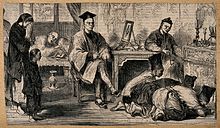Kowtow
act of prostration in Imperial Chinese protocol
Kowtow, which is borrowed from koutou in Mandarin Chinese. [1] It is a traditional prostration common in Eastern Asia. It means kneeling and bowing one's head to the ground. Kowtow is used in showing respect to parents or gods, or as a form of punishment by the parents when one has done something wrong. In the Qing Dynasty of China, the main usage of kowtow was to show respect and loyalty to the king.

Nowadays, people seldom kowtow and bow to others instead. However, in some Chinese weddings, the couple kowtow to the parents. At some schools in Taiwan, students still have to kowtow to thank their teachers.
References
change- ↑ "Kowtow | Chinese ritual". Encyclopedia Britannica. Retrieved 2020-08-16.